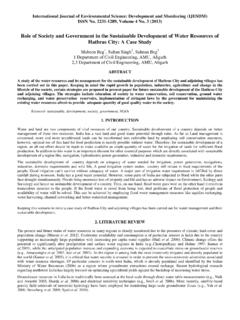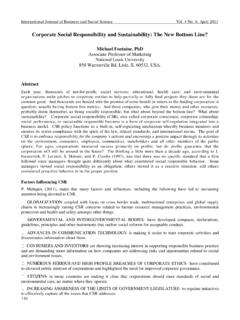Transcription of Corporate Governance and Business Ethics
1 Global Journal of Management and Business Studies. ISSN 2248-9878 Volume 3, Number 10 (2013), pp. 1085-1090 Research India Publications Corporate Governance and Business Ethics Renu Nainawat1 and Ravi Meena2 Girl s College, Kota, Raj. 2 Govt..Commerce College, Kota. Abstract Questions of Ethics ,or the right way to run a Business ,are inherent in all aspects of Corporate Governance and in every board decision and action. Ethical choices are relevant within the core Business strategies that boards pursue and the way that direct the Business as a whole to achieve them.
2 The present paper provides a brief account of Indian Corporate Governance , Corporate Governance Codes, guidelines, Business Ethics , benefits of Business Ethics . This article also analyses the relationship between Corporate Governance and Business Ethics . Keywords: Business Ethics , Corporate Governance . 1. Introduction Corporate Governance lies at the heart of the way businesses are run. Of ten defined as the way businesses are directed and controlled , it concerns the work of the board as the body which bears ultimate responsibility for the Business .
3 Governance relates to how the board is constituted and how it performs its role. It encompasses issues of board composition and structure, the board s remit and how it carried out and the framework of the board s accountability to its stakeholders. It also concerns how the board delegates authority to manage the Business throughout the organization. The word Corporate Governance (CG) has become a buzzword these days due to various Corporate failures world over in recent past. The Corporate Governance represents the value framework, the ethical framework and the moral framework under which Business decisions are taken.
4 In other words, when investment takes place across national borders, the investors want to be sure that not only their capital handled effectively and adds to the creation of wealth, but the Business decisions are also taken in a manner which is not illegal or does not involve moral hazards ( verma & Suman gupta, 2004). The Corporate Governance basically denoted the rule of law, Renu Nainawat & Ravi Meena 1086transparency, accountability and protection of public interest in the management of a company s affairs in the prevailing global and competitive market milieu.
5 It called for an enlightened investing community and strict regulatory regimes to protect the rights of the investors and companies to improve productivity and profitability without recourse to any means which would offend the moral, ethical and regulatory framework of Business . 2. Essentials of Good Corporate Governance Good Corporate Governance is a formal system of Accountability and Control of ethical and socially responsible decisions and use of resources. The following are the chief characteristics of Good Corporate Governance : it is 1.
6 Participatory 2. Consensus Oriented 3. Accountable 4. Transparent 5. Responsive 6. Effective and Efficient 7. Equitable and Inclusive and 8. Follows the Rule of Law. 3. Business Ethics Business Ethics is a kind of applied Ethics . It is the application of moral or ethical norms to Business . The term Ethics has its origin from the Greek word ethos , which means character or custom- the distinguishing character, sentiment, moral nature, or guiding beliefs of a person, group, or institution. Ethics is a set of principles or standards of human conduct that govern the behaviour of individuals or organization.
7 Ethics can be defined as the discipline dealing with moral duties and obligation, and explanation what is good or not good for others and for us. Ethics is the study of moral decisions that are made by us in the course of performance of our duties. Ethics is the study of characteristics of morals and it also deals with the moral choices that are made in relationship with others. Business Ethics comprises the principles and standards that guide behaviour in the conduct of Business . Businesses must balance their desire to maximise profits against the needs of the stakeholders.
8 Maintaining this balance often requires tradeoffs. To address these unique aspects of businesses, rules- articulated and implicit are developed to guide the businesses to earn profits without harming individuals or society as a whole. Corporate Governance and Business Ethics 1087 4. Advantages of Business Ethics More and more companies recognize the link between Business Ethics and financial performance. Companies displaying a clear commitment to ethical conduct consistently outperform companies that do not display ethical conduct.
9 5. Attracting and Retaining Talent People aspire to join organizations that have high ethical values. Companies are able to attract the best talent and an ethical company that is dedicated to talking care of its employees being equally dedicated in taking care of the organization. The ethical climate matters to the employees. Ethical organizations create an environment that is trustworthy, making employees willing to rely, take decisions and act on the decisions and actions of co-employees. 6. Investor Loyalty Investors are concerned about Ethics , social responsibility and reputation of the company in which they invest.
10 Investors are becoming more and more aware that an ethical climate provides a foundation for efficiency, productivity and profits. 7. Customer Satisfaction Customer satisfaction is a vital factor in successful Business strategy. Repeat purchases or orders and enduring relationship of mutual respect are essential for the success of the company. The name of a company should evoke trust and respect among customers for enduring success. This is achieved by a company that adopts ethical practices. When a company because of its beliefs in high Ethics is perceived as such, any crisis or mishaps along the way is tolerated by the customers as a minor aberration.














